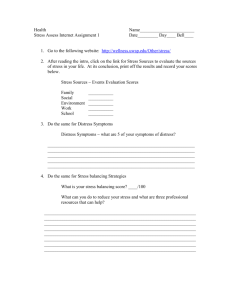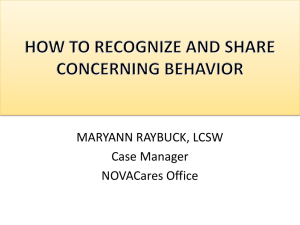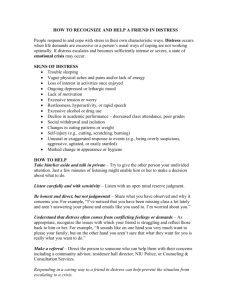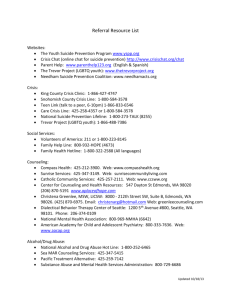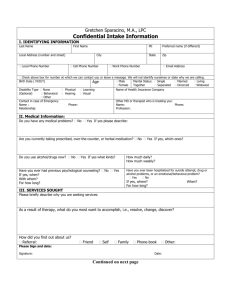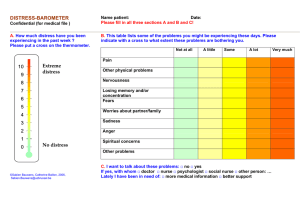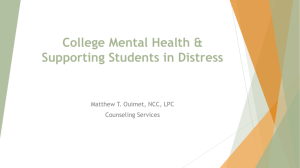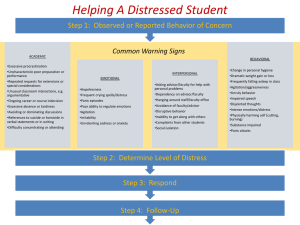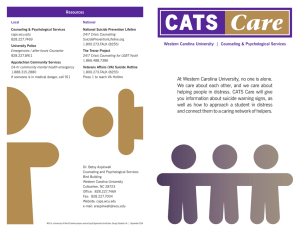Presenter
advertisement
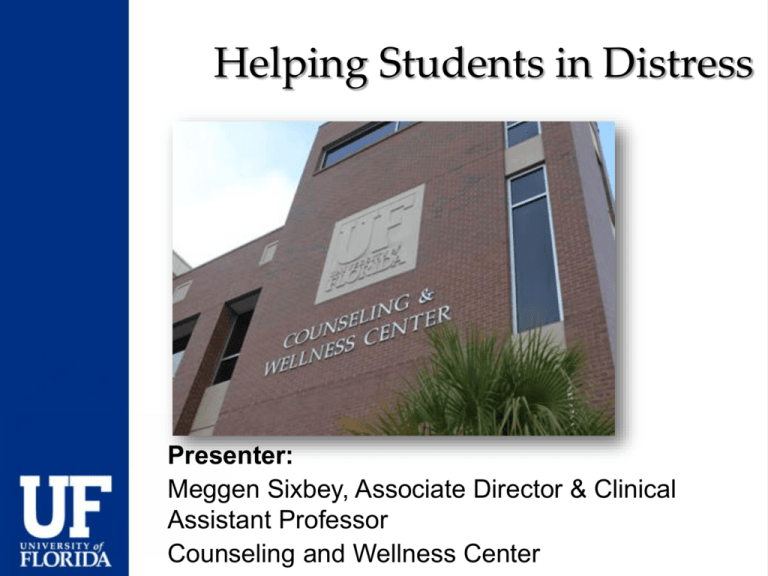
Helping Students in Distress Presenter: Meggen Sixbey, Associate Director & Clinical Assistant Professor Counseling and Wellness Center A Profile of Student Well-Being Association of University and College Counseling Center Directors (AUCCCD) – – – – – – – – 13.7% significant history of prior treatment 24.7% taking psychotropic medications 38.0% reported depression 40.4% reported anxiety 36.3% relationship issues 9.0% engaged in self injury 15.2% suicidal thoughts and behaviors 11.3% alcohol abuse/dependence A Profile of Student Well-Being American College Health Association (ACHA) – National College Health Assessment: In the last 12 months – – – – – – – Felt things were hopeless 21% Felt very lonely 22% Felt so depressed it was difficult to function 16% Seriously considered suicide 4.6% Attempted suicide 0.8% NSSI 3.2% Did something they later regretted due to drinking alcohol 36% A Profile of Student Well-Being ACHA – Top 8 Impacts on Academic Performance within the last 12 months: – – – – – – – – Stress 29.0% Sleep Difficulties 20.6% Anxiety 20.2% Cold/Flu/Sore throat: 15.6% Work 13.9% Internet use/computer games 13.2% Depression 12.4% Concern for a troubled friend or family member 11.1% Signs of Mild to Moderate Distress Fatigue and sleeping in class Irritability Preoccupation Missed deadlines or incomplete work Frequent or inappropriate emails Poor hygiene Significant changes in mood Resistant to accept help Repeated requests for special considerations or adjustment to academic requirements Expression of emotions more intensely Disrupting classroom culture (e.g. angry outbursts in class, walking out, failing to collaborate, attacking the opinion of others) Helping this Student Listening 101 Consult with campus resources Work with the student on an individual level Address specific behaviors of concern Be clear about expectations and consequences Refer to campus resources Document your interaction Signs of Severe Distress Similar to signs of mild to moderate distress but often with an increase in frequency and/or intensity May view efforts to assist as intrusive Little regard or deference to the role of the instructor Lack of empathy for others Verbally antagonistic to peers/instructor Unwilling to collaborate with team members Slurred speech, confused content, highly suspicious of others Engage in inappropriate forms of contact Veiled or overt references to suicidal or homicidal thoughts Helping this Student If this student does not pose an imminent threat: Utilize similar tools as those with the mild to moderately distress student Avoid promising confidentiality Avoid making promises Focus on an aspect of the problem that can be managed Contact the Dean of Students Office If this student does pose an imminent threat: Maintain a safe distance Attempt to maintain a calm demeanor and level voice Remove yourself and call UPD (352.392.1111) More Training Available At-Risk: Kognito 45 minute, online interactive training Identify, approach, address common indicators of psychological distress in students Available through the CWC website at www.counseling.ufl.edu Question, Persuade, Refer (QPR) 90 minute, in-person, training Learn myths regarding suicide, warning signs, how to inquire about suicide, and refer to resources Learn more through the CWC website at www.counseling.ufl.edu or call 352.392.1575 Video: UF Resources for Students in Distress Available for viewing at: www.counseling.ufl.edu/cwc/helping-students-in-distress Campus Resources • • • • • • • • • Dean of Students Office Counseling and Wellness Student Health Services Office of Victim Services International Center Housing and Residence Division of Student Affairs Employee Assistance Prog University Police 352.392.1261 352.392.1575 352.392.1161 352.392.5648 352.392.5323 352.392.2171 352.392.1265 352.392.5787 352.392.1111 Community Resources • Alachua County Crisis Center 352.264.6789 • Information and Referral 352.332.4636 or 211 • Alachua County Sheriff 911 • Gainesville Police Dept 911 • Alachua County Fire 911 • Gainesville Fire 911
